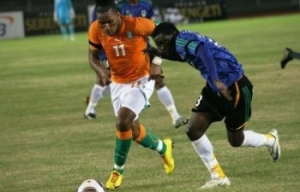This slideshow requires JavaScript.
Malabo may be the capital but the country’s second city, Bata, in many respects is the true heart of this small country.
As the gateway to mainland Equatorial Guinea, Bata has been transformed in the last decade as power has been devolved from the island of Bioko and the president’s hometown of Mongomo.
Much of the country’s most important investments are taking place here ranging from the expansion of the national football stadium in time to host the African Cup of Nations football competition, new port infrastructure and government buildings and courts that represent the strengthening of the state throughout the country.
Further along the coast, beachfront resorts and luxury hotels are being developed as part of the country’s plans to develop its tourism industry.
Its port is also undergoing a massive upgrade to handle the large quantities of cement required to keep pace with the country’s runaway construction industry.
Bata’s importance is underlined by the decision to play the national team’s home games here during next year’s regional football tournament.
The city has also hosted important events including the investiture of president Teodoro Obiang in 2009 held at the Ngoló Palace for International Congress and Conferences.
The same complex was used to launch important reforms to the political system introduced late last month. Parliament meets here regularly showing the president’s desire to avoid the government becoming isolated on the island of Bioko.
Historically the city was populated by the Combe, the tribe that dominates the coastal region, but as it has developed Bata has become a melting pot for Fang from the east of the country, drawn towards the city’s expansion.
Internationally the city looks to receive visitors and immigrants from further a field and international airports, palaces, conference centres and social housing blocks have been built to receive foreign dignitaries, handle the flow of immigrants and host international events.
Arguably the most impressive infrastructure development is the construction of a 5 km maritime causeway, which provides the city’s residents with a modern public space for early morning exercise and social events.
At the end of the popular architectural intervention is the Tower of Liberty, a powerful symbol dedicated to the country’s leader and those that fought with him to liberate the country from the former dictator Francisco Macias.
The country’s equivalent of the Eiffel Tower was completed in October. Equipped with a restaurant the tower is more than 50 m high and has foundations as deep as 18 m.
“Equatorial Guinea enjoys its liberty today thanks to the fight of the nationalists,” president Obiang told those present at the tower’s inauguration in October. “This liberty brings us the independence that allows the government to transform the country. Today Equatorial Guinea is on the path to development and in 2020 it will be an emerging country, which is why we are working hard to develop every sector. We have to make Equatorial Guinea a country of reference. We invite everyone to enjoy this infrastructure so that it will be permanent, because it is with peace that Equatorial Guinea will become a strong, emerging nation.”
The seaside embankment is now being repeated in Malabo with the construction of a similar walkway from the port and passing in front of the presidential palace.
 o the dream continues. The Nzalang have navigated their way safely through the group stage thanks to euphoric victories over Senegal and Libya and a disappointing defeat to Zambia. The Elephants from the Ivory Coast, the strong favourites to win the tournament now wait for the boys in red on Saturday.
o the dream continues. The Nzalang have navigated their way safely through the group stage thanks to euphoric victories over Senegal and Libya and a disappointing defeat to Zambia. The Elephants from the Ivory Coast, the strong favourites to win the tournament now wait for the boys in red on Saturday.